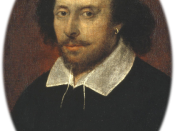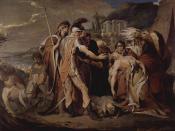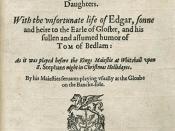Illusion and reality
The first is Shakespeare's exploration of the nature of illusion and reality. This is manifest in a number of ways:
Shakespeare regularly plays with the illusion and deception inherent in the medium of theatre itself, from the complications arising from a boy actor playing a girl dressed up as a boy, to plays-within-plays. By analogy, the theatre becomes the world, in which our assumptions about what is real and what is not may in themselves be illusions.
States of altered reality are a regular element of Shakespeare's plays. They may be minor alterations, such as those induced by love (Antony in Anthony and Cleopatra). They may major alterations of behaviour, such as madness, real or feigned. They may be symbolic - dreams, sleep, the moon, or the contrast between the wilderness or the wood and the urban city or court. They may be expressed in other-worldly spirits, be they a Puck or an Ariel.
Deception is the conscious human imposition of an altered state of reality, and human deception is rife in Shakespeare's plots.
This continuous thread in Shakespeare's work is in part a reflection of a preoccupation of the age, coming to terms with the fusion of to very different modes of thought, and indeed two very different perceptions of the actual reality of the world: the medieval world view, with its basic in Catholic religious thought, and the more rational humanist late-Renaissance world view, with its impetus from classical Greek and Roman thought. Shakespeare is the heir to both world views. His sources are drawn from both medieval or late-medieval writings and from Latin works (and the contrasts of the two world views are exemplified in those actual sources themselves). He regularly combines them, seeks a fusion between the two modes, and suggests that...


